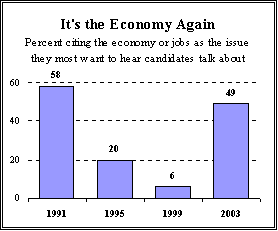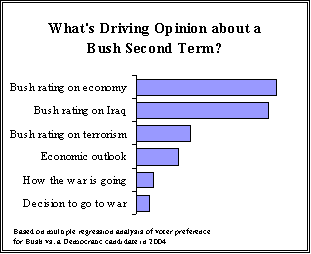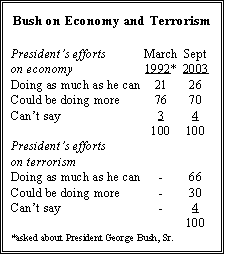Introduction and Summary
 President Bush is facing an electorate that is almost as focused on the economy as it was in the fall of 1991, when rising economic concern began to unravel his father’s reelection chances. In an open-ended format, nearly half (49%) of Americans volunteer the economy or jobs as the single issues they most want the presidential candidates to discuss. That is considerably higher than levels measured at various points during the last two presidential campaigns and is nearly as high as in October 1991 (58%), although more Americans focused on jobs at that time than now.
President Bush is facing an electorate that is almost as focused on the economy as it was in the fall of 1991, when rising economic concern began to unravel his father’s reelection chances. In an open-ended format, nearly half (49%) of Americans volunteer the economy or jobs as the single issues they most want the presidential candidates to discuss. That is considerably higher than levels measured at various points during the last two presidential campaigns and is nearly as high as in October 1991 (58%), although more Americans focused on jobs at that time than now.
The survey also shows that the percentage of voters who want to see the president reelected continues to inch downward. Bush has a statistically insignificant 45%-43% edge over an unnamed Democrat among registered voters. As recently as July, he held a ten-point advantage over a generic Democratic candidate (47%-37%). And while voters say the economy is by far the top issue they want candidates to discuss, opinions toward Bush’s reelection are now linked as closely to views of his handling of Iraq as they are to his stewardship of the economy. (see chart below)
 Analysis of the survey shows that judgments of the way Bush is handling the situation in Iraq is a strong factor in attitudes toward his reelection, while opinions of the decision to go to war are not particularly crucial. This marks a significant change since mid-April, when opinion about the decision to go to war drove voting intentions more than views of the president’s handling of the war. The analysis also shows that the president’s approval rating on handling terrorism, which remain strong at 64%, is not as important a factor in attitudes toward his reelection.
Analysis of the survey shows that judgments of the way Bush is handling the situation in Iraq is a strong factor in attitudes toward his reelection, while opinions of the decision to go to war are not particularly crucial. This marks a significant change since mid-April, when opinion about the decision to go to war drove voting intentions more than views of the president’s handling of the war. The analysis also shows that the president’s approval rating on handling terrorism, which remain strong at 64%, is not as important a factor in attitudes toward his reelection.
The latest Pew Research Center national survey of 1,500 adults, conducted Sept. 17-22, shows that while two-thirds (66%) say Bush is doing all he can to protect the U.S. from terrorism, fewer than half that many (26%) say the same about his efforts to improve economic conditions. In fact, almost as many believe the president could be doing more to fix the economy as said that about the elder Bush during the 1992 campaign (70% now, 76% in March 1992).
 The president’s overall approval rating stands at 55%, largely unchanged from mid-August (56%). However, a daily breakdown of the survey results shows Bush’s approval score slipping to 51% at the end of the polling period (Sept. 21-22). And his approval ratings on specific issues with the notable exception of terrorism are weak. Nearly half (48%) disapprove of his handling of the economy while 43% approve. His rating on health care is even more negative (33% approve, 46% disapprove). And views of Bush’s handling of the situation in Iraq have eroded significantly since April. Fully 77% approved of his performance on Iraq in mid-April, following the fall of Baghdad; today, just 52% do so.
The president’s overall approval rating stands at 55%, largely unchanged from mid-August (56%). However, a daily breakdown of the survey results shows Bush’s approval score slipping to 51% at the end of the polling period (Sept. 21-22). And his approval ratings on specific issues with the notable exception of terrorism are weak. Nearly half (48%) disapprove of his handling of the economy while 43% approve. His rating on health care is even more negative (33% approve, 46% disapprove). And views of Bush’s handling of the situation in Iraq have eroded significantly since April. Fully 77% approved of his performance on Iraq in mid-April, following the fall of Baghdad; today, just 52% do so.
But the president’s twin strengths his handling of the war on terrorism and his personal image continue to anchor his overall job approval in the face of criticism on other fronts. More than six-in-ten Americans (64%) approve of the job Bush has done in dealing with terrorist threats, only a modest decline since January (69%). The president’s ratings on key personal characteristics like empathy and leadership continue to be positive. Roughly two-thirds (68%) say they see Bush as a strong leader, unchanged since the start of his term.
The new survey also shows the race for the Democratic presidential nomination has become more jumbled with Ret. Gen. Wesley Clark’s entrance into the race. Clearly, Clark’s decision to seek the nomination registered strongly with Americans, even though it occurred as news of Hurricane Isabel commanded the public’s attention. Asked to name any of the Democratic candidates, 15% identified Clark, which puts him on par with Sen. John Kerry (19%), former Gov. Howard Dean (19%) and Sen. Joe Lieberman (14%) in public awareness.
In terms of overall appeal, Clark also has quickly moved into the first tier of Democratic candidates. About half (53%) of those voters who have heard of Clark say there is at least some chance they will vote for the retired general. Four other candidates have roughly comparable levels of potential support Lieberman (50%), Kerry (49%), Rep. Dick Gephardt (47%), and Dean (46%). Bush retains a solid lead over any Democrat on this measure, as 64% say there is at least some chance they would vote for the president.
The survey suggests that Americans may not be all that favorably impressed by Clark’s resume. Asked which types of experience best prepare someone to be president, a 35% plurality cited previous service as a governor and 27% said serving in Congress provided the best experience. Just one-in-ten think that experience as a general or admiral best prepares someone to be president; more (15%) cited experience as a business executive.


